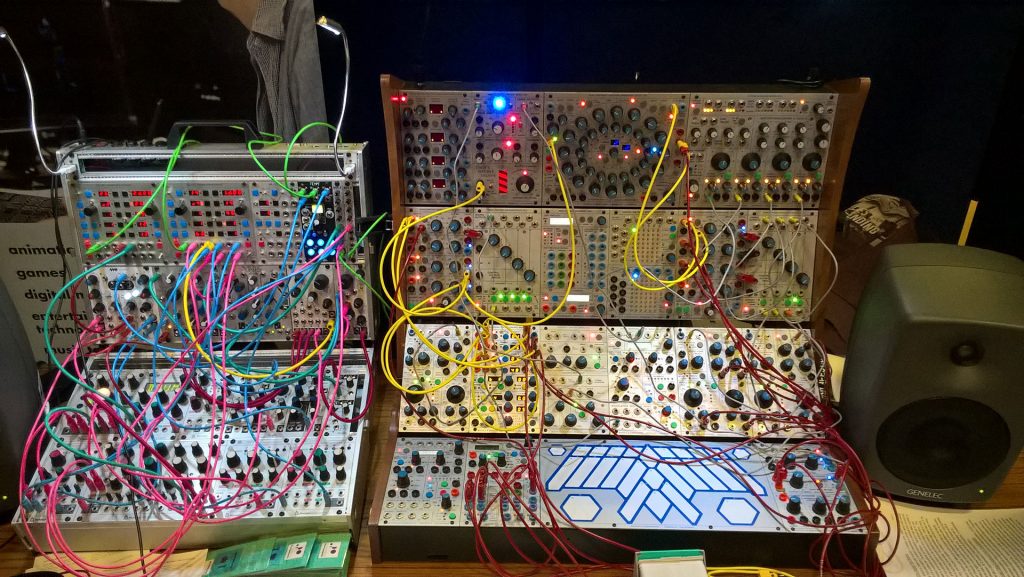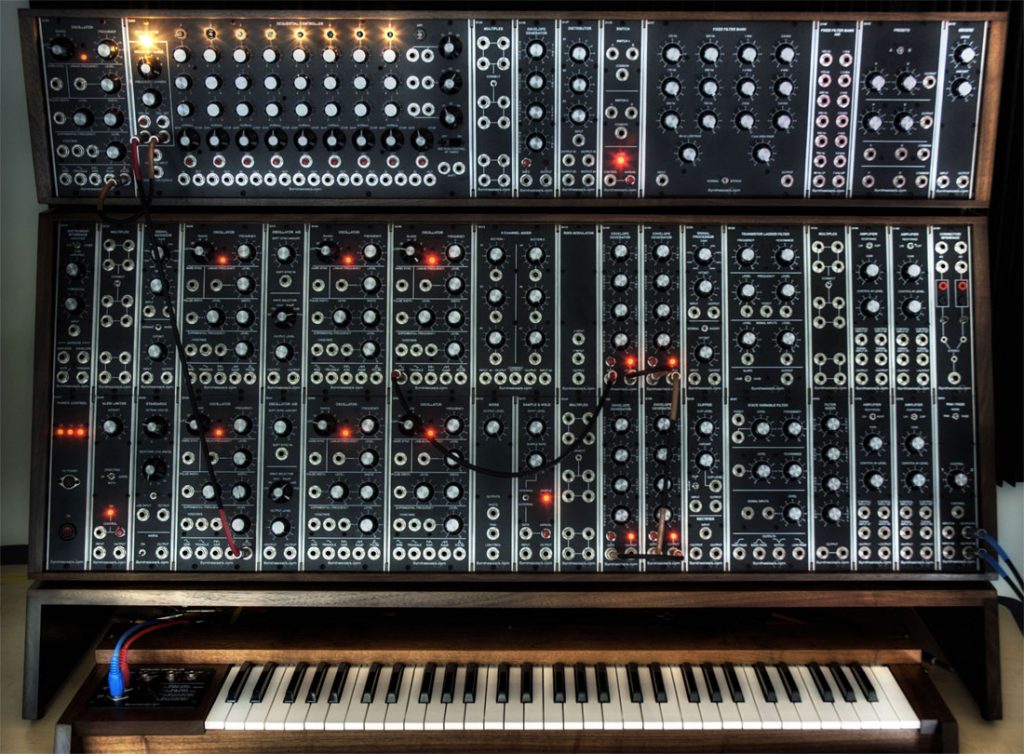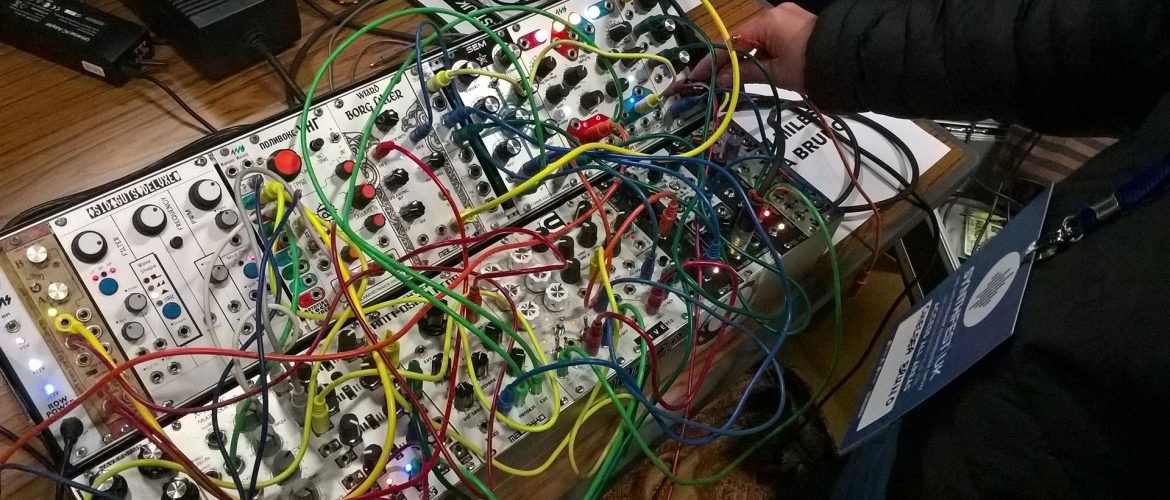If you are interested in taking steps into modular synthesis but you’re not a synth nerd or feel out of your depth on the various modular forums and facebook groups then you’ve come to the right place. Follow my journey and benefit from my mistakes and mishaps. I’m told I have a good way of explaining and revealing music technology and I hope this series of articles and videos will be helpful to your journey. Or at least mildly interesting.
Modular synthesis has captured the imagination of the electronic musician. We’re lapping up the videos of flashing lights and beeping noises, the patch cables, the creativity and the sense of synthesizer self determination. It has the ability to democratise synthesis, to let you design and build your own music making machine. Why would you ever buy a pre-made synth again?
However, the entry requirements are high. In cost to a degree but also in knowledge and perhaps even bravery. At the SynthFest in Sheffield the question on everyone’s lips was “where do you start with modular?”. I overheard many conversations, had several myself and even attended a Sound On Sound lecture called “How to get started with Modular” and yet I don’t think any nails were hit on the head.
Most of the responses in conversation were rather vague and seemed to be along the lines of “I got a couple of modules and just starting patching and here I am with a massive eurorack.” The seminar had some interesting content and helpful suggestions but it didn’t really answer the basic question either.
In gathering my own thoughts and research on the subject I’ve come to the conclusion that there is no right and easy answer – and perhaps there shouldn’t be. Modular synthesis is complicated. You have to have a certain amount of knowledge about how the building blocks of synthesis work. And then there’s the matter of getting your hands dirty in dealing with cases, power supplies and wiring. These things don’t need to be barriers to entry but with an extremely free, diverse and open format it’s difficult to pin it down to a simple shopping list.
So here’s my thinking within my own journey into modular. You may follow a completely different path – and that’s ok. But there has to be way to start without getting your mind boggled by the complexity – a way to enter into the conversation without knowing your mults from your dividers.
Approach
One annoying and yet important question to ask yourself is – what am I hoping to achieve? It’s good to give this some thought because it will affect the path of your journey – it’ll also give you something intelligent to say to your partner who wants to know where all your money is going and why you can’t have a foreign holiday again this year.
In a very general sense there are two modular methodologies, which also fall into the synthesis styles known as East coast and West coast. East Coast is musical, keyboard based and performance led, epitomised by Moog who operate out of North Carolina on the East coast of America. West Coast is experimental, sequencer based and programming led, epitomised by Buchla operating out of California on the West coast of America. Both are completely valid approaches to modular synthesis and there is plenty of cross pollination and mixing between the two. The important distinction perhaps is that Moog pushes the playable, traditional way of making music based upon your ability to play a piano, whereas Buchla invites experimentation, and machine based sound generation where no musical training is required. Of course in Europe we mix it up all over the place.

Synthfest 2016 Buchla

Moog Modular
There’s an excellent article on this by a guy calling himself Herr Absurd which is well worth a read:
http://absurdwurld.blogspot.co.uk/2016/11/what-kind-of-electronic-musician-are-you.html
For me I come at this in a somewhat paradoxical fashion – what else? I adore some of the music I hear generated by Buchla systems and I’m completely repelled by others. I find both an uncommon beauty in the music and a lot of uninspiring noises. One video clip with be simply breath-taking while another just a bunch of crap generated by an enormous science experiment. I have some musical training and enjoy traditional chord frameworks and melody although I also want to experiment with discovered sound and machine programming. I want to be totally free from presets and yet I want to be able to recreate my music for performance. I want to push artistic boundaries with electronic adventures in wizardry but I also want to write pop songs. So in other words my approach is a mess and my appreciation of electronic music is narrow and naïve.
My budget is also small to say the least and so I can see no future where I’ll have racks and racks of interlaced modular gear. I’m looking to create the smallest and yet most interesting and creative modular system I can. I need to keep things in perspective and realise that this is an ongoing process. It will take time, small steps and a bit of planning to get there.
But what do I hope to achieve? Well, I love ambient electronic sound. I love patterns of music, sequences and the sound of a good filter. What I want is a system that invites me to play and experiment in the moment. That is simple enough to use and yet complex enough to challenge me in sound generation. A system that can play nicely with my digital studio and find itself enhanced by each other’s world.
I am not an expert in synthesis or electronics (although I do have a degree in Music Technology which included both) but I’ve been in the music tech industry for 20 years and have been playing with synths ever since my dad bought a Yamaha DX100 back in the 1980’s. What I mean by saying that is that although I have loads of experience with synthesizers I still don’t know what these modular people are talking about half the time. So if the language seems impenetrable it’s ok, it’s not just you. There are levels to how deep you can dive into this stuff and I don’t wish to become a deep diving expert, I want to play, have fun and hopefully learn some things on the way.
So, we’re going to start here. Let’s see where we get to.
